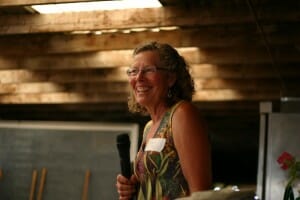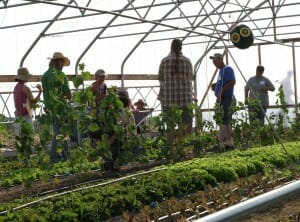Planning for production of a 9-month Community Supported Agriculture Farm: Jutz Field Day Report
80 people participated in the recent Practical Farmers of Iowa Field Day Planning production for a 9-month CSA at ZJ Farms owned and operated by Susan Jutz of Solon, Iowa. Attendees ranged from beginning farmers looking to start their own CSA, current CSA farmers, and CSA members interested in supporting their farmer.
“We have grown and raised just about everything at one time or another on this farm -pigs, sheep, cattle, dairy. We started with our vegetable CSA back in 1996 and that is what we have found to generate the most profit.”
“We built our customers through word of mouth, at the dentist, at the doctor, at school, at the grocery store, when the freezer goods home deliveryman came to the farm, my son taught him a new word: CSA – Community Supported Agriculture,” remembers Susan.
Multi producer CSA
Susan cooperates with her neighbor, farmer Laura Krouse whose farm is better suited for larger fields of crops that require more space (potatoes, winter squash, sweet corn). This relationship allows the farms to avoid duplicating their efforts to produce certain crops.
Fertility
Susan maintains a flock of 30 Ewes that graze the balance of the 80-acres of pasture across rolling hills. Manure from the winter housing of the Sheep has been added to the vegetable fields every year for about twenty years. “I had a Midwest Bio-Ag sales representative out and they said there was not a thing they could sell me because my soil was so well balanced in nutrients,” Susan says.
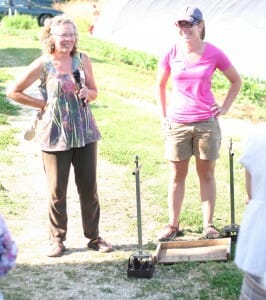
Soil Blocks
Susan’s production system is built on a foundation of the “soil block” method where soil is packed into blocks and seeds are started in these blocks until they are transplanted into the field by hand. This practice eliminates the need to purchase plastic “flats” to grow out transplants each year and reduces transplant shocks as the whole root mass is transplanted without disruption.
High Tunnels
Susan uses two high tunnels to extend her production year into the winter and earlier in the spring. She prefers the new “V-Track Tunnels” design she purchased from Four Season Tools compared to an older model high tunnel greenhouse on the farm.
“You have to keep weeds out of your tunnels, and use every inch of space to make your tunnels work for you,” says Susan. Growing well in blistering summer heat, was an unexpected crop of head lettuce. “I find that the plastic of the high tunnel provides just enough shade and excellent protection from damaging rains to grow high quality head lettuce all summer long.”
Craig Chase, ISU Extension Field Specialist shared a new publication on the economic profitability of high tunnel vegetable production. His results compiled from five farmer participants indicate that you can generate as much gross sales in one 30 feet wide by 96 feet long high tunnel greenhouse as you can in on a whole acre of land (about 210 feet by 210 feet). Publication results are available online.
Organic Cucurbit production on-farm research
Cucumber beetles transmit wilt in the Cucurbit family including muskmelons, pumpkins, squash, and cucumbers. Bacterial wilt, squash bug and cucurbit yellow vine disease, and squash vine borer can devastate yields. The presence of disease is inconsistent and geographic distribution is highly variable.
Physical exclusion of cucumber beetles seems to be the most practical solution for organic growers using “row cover” a fabric barrier draped over the plants at the time of planting held to the ground by covering the ends of the fabric all around with soil. This barrier must be removed for pollination to occur at the time of anthesis, when the flower is fully open and functional.
A team of researchers across the country at Iowa State University (ISU), Penn State University, and University of Kentucky are working on this issue with farmer collaborators including Susan Jutz. Results on their work is available online.
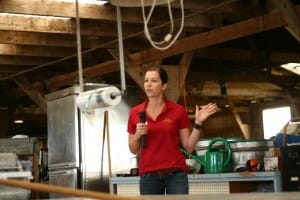 Erika Saalau Rojas, Ph.D. candidate in the ISU Department of Plant Pathology and Microbiology, and also an Extension Associate in the ISU Plant and Insect Diagnostic Clinic researches this disease.
Erika Saalau Rojas, Ph.D. candidate in the ISU Department of Plant Pathology and Microbiology, and also an Extension Associate in the ISU Plant and Insect Diagnostic Clinic researches this disease.
“It is a gamble, if you don’t use rowcover, and the cucumber beetles come, you will lose your whole crop,” Erika says. “If you do use it and the beetles never come, you spent a lot of money and time with the rowcover for nothing.”
“We ask growers, ‘Do you feel lucky?’ Many are choosing to plant under rowcover,” says Erika.
In previous years, cucurbit disease has been a tremendous problem for Susan Jutz but not in the past three years. An on-farm research project with three treatments and a control are under observation at Susan’s farm but so far no beetles have been observed. All plants look wonderful without any indication of disease.
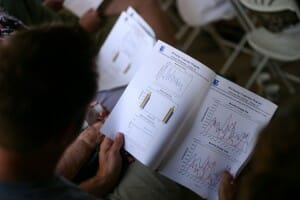
On-Farm energy usage analysis
Rich Schuler, PFI Energy Consultant, discussed the work he is coordinating with farmers who seek to reduce their energy use and carbon footprints. Data tracking of electricity, propane (or natural gas), diesel, gasoline, and gasohol helps illuminate areas of the farm that could be improved for energy efficiency and carbon emission reductions. For example, data at Susan’s farm shows a high electricity energy use from heat lamps used in the barn during lambing season. Susan could invest in alternatives like LP heaters as the energy source to reduce her electricity use and carbon emissions.
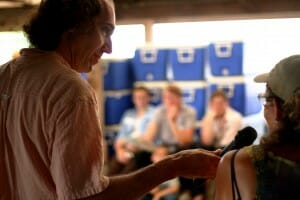
A quick energy use assessment by Rich noted that Susan’s walk-in cooler in direct sunlight is likely using more energy to keep things cool in the middle of the day than it would if it was shaded or coated with highly reflective paint. Electricity generated from burning fossil fuels emits the greatest carbon per energy unit (i.e., pounds of carbon dioxide per British Thermal Unit of energy) due to the energy losses in the generation and transmission from the power plant. In such a case, switching to LP heating sources can be a more carbon friendly solution.
Community food
 A community meal was prepared by former employee of the farm, Emily Silliman. She featured the farm fresh vegetables from ZJ Farms in several delicious salads and an all-Iowa cheese plate with crackers. Grass-based livestock grazier, Dan Spechtof McGregor, IA, prepared tender beef short ribs. Dan has been direct marketing beef through Susan’s Local Harvest CSA customers. Individual packages of meat are available only to CSA members.
A community meal was prepared by former employee of the farm, Emily Silliman. She featured the farm fresh vegetables from ZJ Farms in several delicious salads and an all-Iowa cheese plate with crackers. Grass-based livestock grazier, Dan Spechtof McGregor, IA, prepared tender beef short ribs. Dan has been direct marketing beef through Susan’s Local Harvest CSA customers. Individual packages of meat are available only to CSA members.

